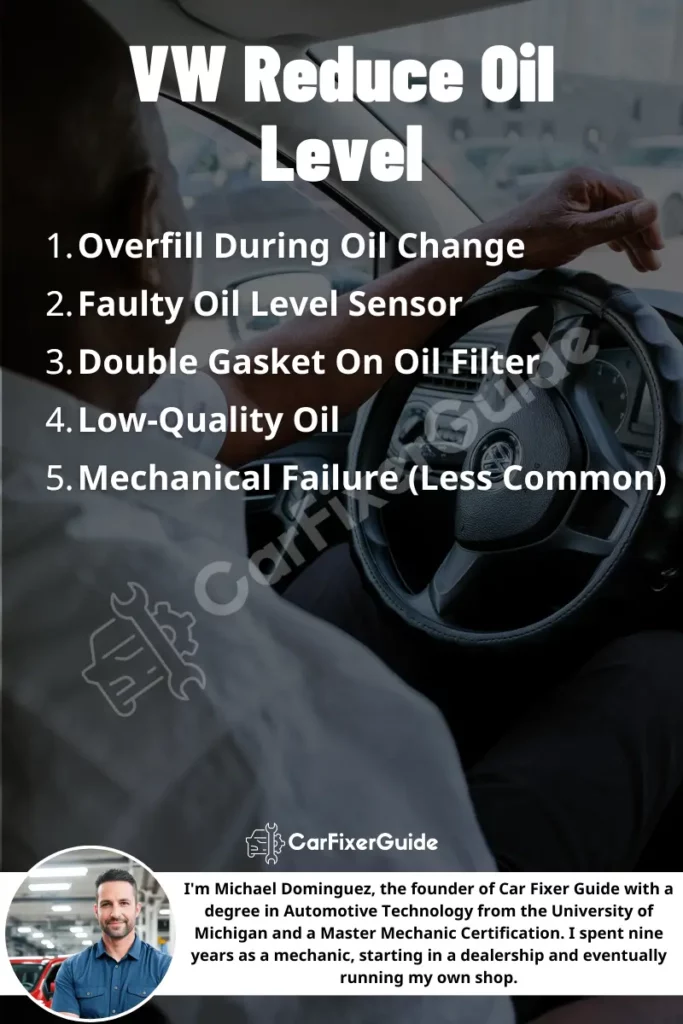Facing the dilemma of a Volkswagen with an overfilled oil tank is more common than you might think, and it’s a situation that requires immediate attention.
Excess oil can lead to increased pressure, foaming, and even catastrophic engine damage if not addressed promptly. This problem isn’t just about maintaining your vehicle; it’s about safeguarding its heart against potential failure.
In this blog post, I’ll guide you through understanding the critical nature of maintaining proper oil levels in your VW, including how to reduce them safely when they tip over the edge.
You’ll learn practical steps for adjusting your car’s oil volume to optimal levels, ensuring your engine runs smoothly while preventing unnecessary wear or damage.
VW Reduce Oil Level Causes & Fixes

Overfill During Oil Change
When it comes to maintaining your Volkswagen, ensuring the correct oil level is not just about topping up; it’s also crucial to avoid overfilling during an oil change.
Overfilling can lead to a series of engine issues, from reduced lubrication efficiency due to aerated oil to increased pressure in the crankcase, which may compromise seal integrity and lead to leaks or damage.
Specifically for VW vehicles, the precision-engineered components require meticulously maintained conditions for optimal performance.
During an oil change, vigilance is key. It’s essential to consult your VW’s manual for the exact volume required and use a precise measuring tool when adding fresh oil.
Remember that after filling, allowing the vehicle a few minutes idle time lets the oil settle in the pan before checking the level again can prevent this common mistake.
Faulty Oil Level Sensor
In the intricate ecosystem of a Volkswagen engine, every component has its role, with the oil level sensor playing a crucial part in maintaining balance.
This sensor ensures your engine operates within safe lubrication parameters by monitoring the oil quantity. However, when this sensor malfunctions, it can falsely signal an overfill condition or fail to alert you to dangerously low levels.
For VW owners, recognizing symptoms of a faulty oil level sensor—such as erratic oil warning lights or inconsistent readings—is vital. Ignoring these signs can lead not only to reduced vehicle performance but also risk severe engine damage due to improper lubrication.
Fixing a defective sensor promptly is essential for preserving your engine’s health and function.
Double Gasket On Oil Filter
A seemingly minor oversight that can have major repercussions on your Volkswagen’s engine health is the occurrence of a double gasket on the oil filter.
This situation typically arises during an oil change when the old filter’s gasket sticks to the engine, and a new filter—with its own gasket—is installed without removing the old one. This double-layering disrupts the seal, potentially leading to oil leaks.
Oil leaking from such a compromised seal not only reduces the level of oil in your system but can also lead to contamination and decreased lubrication efficiency. For VW engines, renowned for their precision engineering, maintaining optimal lubrication is non-negotiable for preserving performance and longevity.
To prevent this issue, always visually inspect the mounting surface when changing your VW’s oil filter, ensuring that only one gasket—on the new filter—is present before installation.
Low-Quality Oil
The use of low-quality oil in your Volkswagen can have a more profound impact on the vehicle’s performance and engine health than you might initially realize.
High-quality oil plays a pivotal role in ensuring smooth engine operation, optimal lubrication, and efficient heat dissipation. Conversely, inferior oils can fail to provide adequate protection against wear and tear, leading to increased friction among engine components.
For VW engines that are engineered for precision and efficiency, settling for anything less than premium grade oil compromises not just the longevity of the engine but also its responsiveness and fuel efficiency.
Low-quality oils may degrade faster under high temperatures, losing their viscosity—and with it, their ability to maintain an optimal level within the engine.
Ensuring your Volkswagen is serviced with high-grade oil tailored to meet its specific requirements is crucial. This approach not only safeguards your vehicle’s intricate engineering but also helps maintain peak performance levels—a testament to why cutting corners with low-quality oil can be a costly mistake in the long run.
Mechanical Failure (Less Common)
While less common than issues like overfilling or sensor errors, mechanical failures in your Volkswagen can also lead to the necessity of reducing oil levels.
These failures might include problems such as a blown gasket or a crack in the engine block—both of which can cause coolant to leak into the oil system, leading to an apparent rise in oil level.
Such mechanical issues are serious and typically manifest through symptoms like overheating, visible smoke from the exhaust, or an unusual milky appearance of the oil (indicative of coolant contamination).
For VW vehicles that boast high standards of engineering excellence, recognizing and addressing these signs promptly is crucial.
It’s imperative for owners to understand that these conditions do not merely require reducing excess oil but demand immediate attention from qualified professionals. Ignoring them can result in significant engine damage.
In The End
Maintaining the correct oil level in your Volkswagen isn’t just a matter of routine vehicle care; it’s an essential practice that protects and prolongs the life of your engine.
Whether you’re dealing with overfills from oil changes, faulty sensors, or even rare mechanical failures, each scenario underscores the importance of vigilance and precision in automotive maintenance.
By ensuring your VW operates with optimal lubrication, you not only safeguard its performance but also embrace a commitment to preserving its engineering integrity.
This approach transcends basic maintenance, reflecting a deeper appreciation for the sophisticated machinery that powers your journey on every road.

I’m Michael Dominguez, the founder of Car Fixer Guide with a degree in Automotive Technology from the University of Michigan and a Master Mechanic Certification. I spent nine years as a mechanic, starting in a dealership and eventually running my own shop. My hands-on experience led me to create Car Fixer Guide, a platform where I provide in-depth car maintenance and repair guides. My mission is to empower everyone to become their own best mechanic.